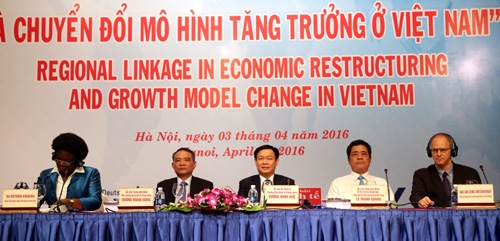 Economy
Economy

Regional connectivity in the economic restructuring and growth model shifting in
 |
HÀ NỘI (VNS) — Regional connectivity amid economic restructuring and a shifting growth model in Việt Nam was in the spotlight at a workshop in Hanoi yesterday.
Head of the Party Central Committee’s Economic Commission Vương Đình Huệ said that the regional economic and connectivity issues received due attention from the Party and State since the 8th National Party Congress.
A report delivered at the 12th Party Congress in January stressed the need to promote each region’s potential with developing key economic areas a priority.
Since 2000, the Government and Prime Minister have issued many relevant documents and region-related issues have been included in socio-economic development orientations, economic restructuring and growth model shifting, Huệ stated.
Regional economic development has yet to fully use the market economy as a foundation for sustainable socio-economic growth.
Development gaps between regions have yet to be narrowed, regional connectivity among cities and provinces remains weak and value chains of intra-regional and inter-regional economic connectivity are still absent.
It is a must to clarify the role of the State in zoning and building development plans for economic regions and discuss mechanisms and policies to address regional economic development-related issues, according to Huệ.
German Ambassador to Việt Nam Carl Georg Christian Berger pointed out that strong regional co-ordination will help localities address issues and contribute to socio-economic development.
Victoria Kwakwa, World Bank Country Director for Việt Nam, said that the bank would collaborate with international organisations and the Vietnamese Government in promoting regional development and co-ordination in Việt Nam.
Development partners in Vietnam released a joint statement backing an initiative to foster regional co-ordination in Việt Nam initiated by the Party Central Committee’s Economic Commission and the Government.
According to participating delegates, region-level urgent issues that cannot be handled by one locality include climate change and saltwater intrusion in the Mekong Delta, drought and water resources management in the Central Highlands, forest management in the northern region and infrastructure upgrade and pollution and investment management in the western central region.
They emphasised the need to build and issue a socio-economic development strategy for each region.
For key economic zones, participants proposed promulgating policies to boost competitiveness with economic centres in ASEAN, Asia and the world.
Held by the Party Central Committee’s Economic Commission, the German Embassy in Việt Nam and the Coordination Committee for the Central Coastal Region, the event aimed to collect ideas on regional economic and regional connectivity development to facilitate the implementation of the 12th National Party Congress resolution in the next five years. — VNS




